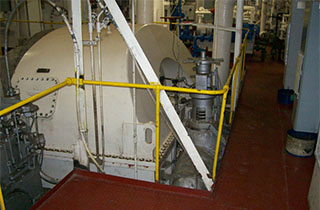Surveyor reports and inspections told of major repairs needed to El Faro’s boilers, work that was planned for a possible November dry docking at Grand Bahama Shipyard, according to testimony heard by the Coast Guard marine board of inquiry investigating the loss of the 790’ TOTE Maritime ship and its 33 crew in Hurricane Joaquin Oct. 1.
One inspection reported the boiler burner throats, which direct fuel and air for combustion, “have deteriorated severely…plus heavy buildup of fuel is present in all three throats.”
Another noted deteriorated fire brick, and recommended “there is extensive work that needs to be done in both furnaces” as soon as possible.
Yet TOTE managers and workers testified they believed the power plant was working well – and even capable of steaming before repairs from its longtime base at Jacksonville, Fla., to TOTE’s Pacific Northwest operation at Tacoma, Wash., if needed.
Despite losing propulsion, captain Michael Davidson still had enough power on the ship to plan for pumping out a flooded hold, according to his last call to TOTE officers ashore. Davidson and his crew could have had partial power from the steam plant, and running power from the main breakers to ballast pumps, former chief engineer James Robinson told the board Tuesday.
In earlier testimony, Jim Fisker-Andersen, director of ship management for subsidiary TOTE Services, said company engineers were aware of the repair recommendations and making plans to have it done before El Faro went to the Northwest. A five-man Polish riding crew was on the ship’s last voyage, making modifications and installing equipment, like new winches for the ro/ro ship’s vehicle ramps, to prepare it for the Alaska route.
“We had to do work to the burn throats, (boiler) economizers,” Fisker-Andersen said. “I didn’t recall anything referred to as urgent or immediate…That would have actually been one we got right after, if that was the case.”
“There aren’t any show-stoppers in here,” Fisker-Andersen said of the inspection reports. “There’s nothing in here, that as has been explained to me, that would be a no-sail. If it was, we wouldn’t have left the dock.”
That decision, he added, was by “all of us on the engineering side.”
The board has heard fewer details about other components of the ship’s propulsion, including traces of tin in lubricating oil and noise in gears that were would warrant attention during the dry docking.




